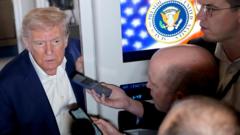In a recent development in U.S.-China trade relations, President Donald Trump's administration has granted exemptions for smartphones, computers, and several other electronic devices from increased tariffs, including a hefty 125% on imports from China. The U.S. Customs and Border Patrol confirmed that the goods will be excluded from Trump's broader 10% global tariff, marking a significant adjustment to his trade policy.
During a flight to Miami, Trump hinted that more details on these exemptions would be unveiled soon, branding the financial gains from tariffs as beneficial for the country. This exemption represents a crucial moment for tech investors and companies, with experts labeling it a "game-changer." Dan Ives, a prominent tech analyst, expressed optimism for the tech industry, emphasizing that the exclusion of crucial products like smartphones and semiconductors could dramatically alter the landscape of tariffs imposed on China.
The announcement follows mounting pressure from U.S. tech firms, concerned that escalating costs of electronic devices could lead to significant price hikes for consumers. Other covered products include semiconductors, solar panels, and various memory components. The move appears aimed at providing companies some breathing room to consider relocating manufacturing bases back to the U.S., a goal underscored by White House Press Secretary Karoline Leavitt.
Despite the easing of some tariffs, Trump remains resolute in maintaining high tariffs on Chinese imports. He expressed confidence that the trade pressure would lead to beneficial outcomes for the U.S. economy, highlighting the administration's stance that critical technology manufacturing should not rely solely on China.
While U.S. consumers still face a 20% tariff on China related to fentanyl, the exemptions aim to alleviate potential price surges for popular products like iPhones, which analysts warned could see costs drastically rise if tariffs were fully imposed. Apple and other major tech companies have been actively working to diversify their supply chains to reduce dependencies on China, with India and Vietnam emerging as attractive alternatives for manufacturing.
As Trump's tariffs evolve, the focus on fair trade practices and the returning of jobs to American soil remains a central theme of his economic strategy. Recently, Trump announced a 90-day delay on mandating new tariffs for other countries, with an eye towards negotiating more favorable trade conditions while applying heightened tariffs specifically to China, which faces its own retaliatory measures.


















